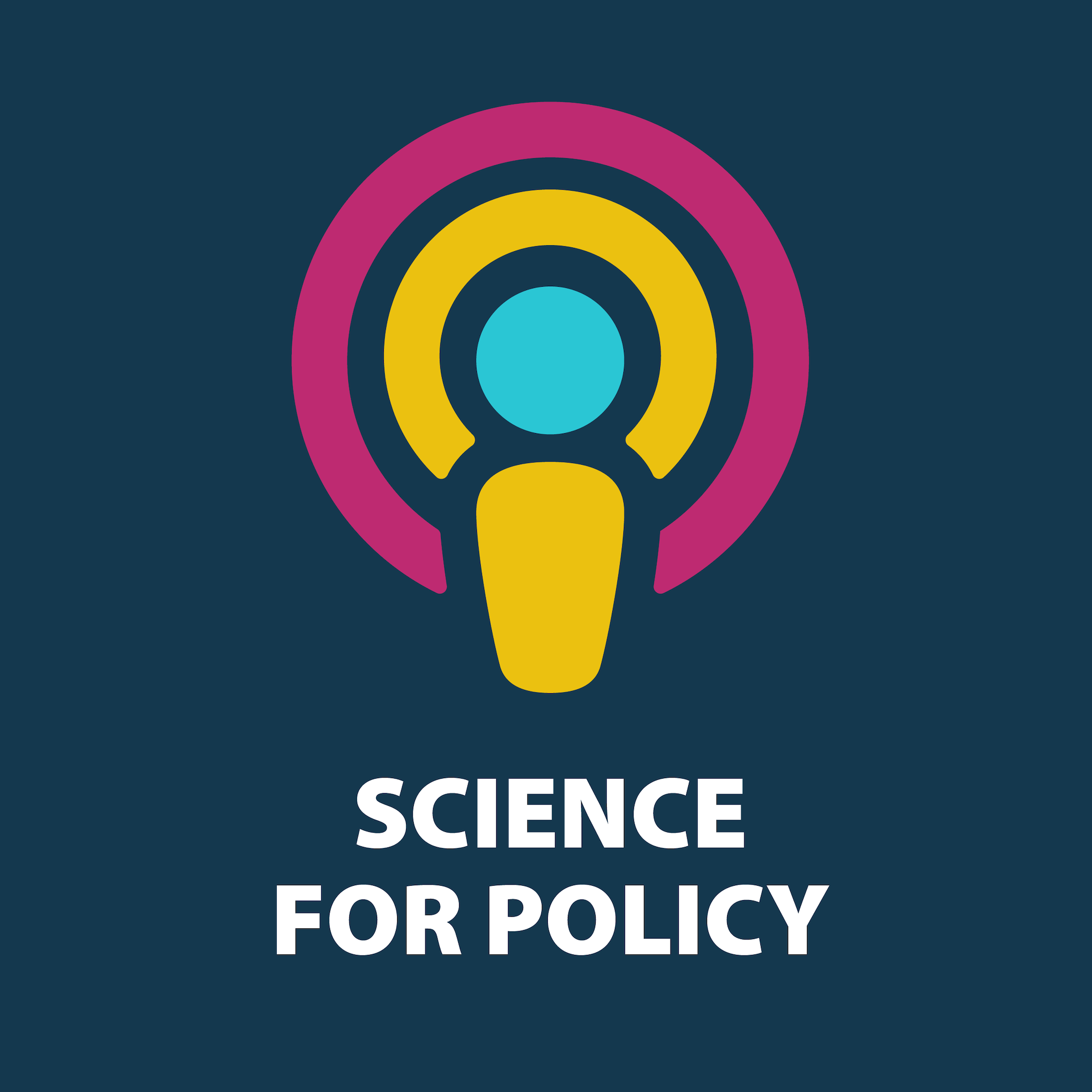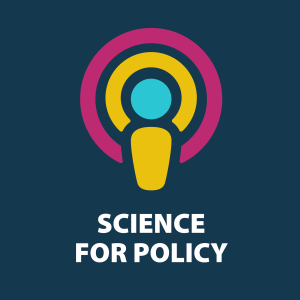
How far should we rely on science to make political decisions? What makes a good science advisor — or a good science advice system? What do we do when the evidence is incomplete or controversial? What happens when science advice goes wrong and how can we fix it? We explore these questions, and many more, in conversation with the researchers, policymakers and communicators who make science advice happen around the world. The Science for Policy podcast is produced the Scientific Advice Mechanism to the European Commission and hosted by Toby Wardman. The many and varied opinions expressed on this podcast are those of the guests themselves. They do not necessarily represent the views of SAPEA or the European Commission.
How far should we rely on science to make political decisions? What makes a good science advisor — or a good science advice system? What do we do when the evidence is incomplete or controversial? What happens when science advice goes wrong and how can we fix it? We explore these questions, and many more, in conversation with the researchers, policymakers and communicators who make science advice happen around the world. The Science for Policy podcast is produced the Scientific Advice Mechanism to the European Commission and hosted by Toby Wardman. The many and varied opinions expressed on this podcast are those of the guests themselves. They do not necessarily represent the views of SAPEA or the European Commission.
Episodes

Monday Nov 16, 2020
Monday Nov 16, 2020
Why does European Commission science advice work the way it does? Why did former President Juncker discontinue the standalone post of chief science advisor? Why has the EU settled on a hybrid model which combines advisors, academies and officials?
Maria da Graça Carvalho MEP discusses these questions with Toby Wardman of SAPEA. We also discuss the separate role of the Joint Research Centre, how to attract women and girls to high-salary tech jobs of the future, and whether any science can survive the entire legislative procedure.
Resources discussed in this episode
The Science Advice Mechanism: https://ec.europa.eu/info/research-and-innovation/strategy/support-policy-making/scientific-support-eu-policies/group-chief-scientific-advisors_en

Monday Nov 02, 2020
Cary Funk on whether people trust science
Monday Nov 02, 2020
Monday Nov 02, 2020
What does our best available evidence tell us about public trust in science and science advice? How has that evolved recently? And what's the moral of the story for science advisors, policymakers, and the people who design science advice systems?
Dr Cary Funk of Pew Research in Washington DC discusses these questions with Toby Wardman of SAPEA. We also discuss whether you can educate people into trusting you, why people give confusingly different answers to seemingly similar questions, and what ‘trust’ actually means anyway.
Resources discussed in this episode
- Pew Research's study on trust in scientists: https://www.pewresearch.org/science/2020/09/29/science-and-scientists-held-in-high-esteem-across-global-publics/

Monday Oct 19, 2020
Clarissa Rios Rojas on talking to policymakers about catastrophic risk
Monday Oct 19, 2020
Monday Oct 19, 2020
Is it possible to develop a unified science of catastrophic risk? How can we convince policymakers to take risks to human existence seriously enough? How can we improve our foresight so that we can spot the next big disaster before it hits us?
Dr Clarissa Rios Rojas discusses these questions with Toby Wardman of SAPEA. We also discuss how to start a difficult conversation with a politician, whether future doomsday manuals should be stuffed into envelopes or just put online, and why being a scientist is cool.

Thursday Oct 15, 2020
Mark Walport on the UK's use of science advice during COVID-19
Thursday Oct 15, 2020
Thursday Oct 15, 2020
Should scientists be free to speak out if they don’t like how politicians use science? Who is to blame if government policy doesn’t follow advice? Why were some countries hit harder than others by COVID in the spring, and did the quality of science advice have anything to do with it? When do scientists speak as scientists, and when are they simply ordinary citizens?
Sir Mark Walport discusses these questions with Toby Wardman of SAPEA. We also discuss the job of a chief scientific advisor, who's really in control of coronavirus (hint: it's not us), and why UK emergency response committees have such awesome names.

Monday Oct 05, 2020
Vladimír Šucha and Marta Sienkiewicz on why science advice needs to change
Monday Oct 05, 2020
Monday Oct 05, 2020
How can science advice — and science in general — keep up with dramatic changes in the world? How do you build an organisation that can translate scientific results into policy solutions? What responsibilities do politicians have when they choose to ignore or override scientific advice?
Vladimír Šucha and Marta Sienkiewicz discuss these questions with Toby Wardman of SAPEA. We also discuss the nature of trust, how intimately linked scientists and politicians can safely become, and whether scientists do in fact know everything.
Resources discussed in this episode
- Science for Policy handbook: https://ec.europa.eu/jrc/communities/en/community/evidence4policy/document/science-policy-handbook

Monday Sep 21, 2020
Bart Koelmans on communicating risk and uncertainty to policymakers
Monday Sep 21, 2020
Monday Sep 21, 2020
Do policymakers and scientists have different understandings of "risk"? How can scientific uncertainty be pinned down and quantified? When experts disagree about the evidence, is there anything useful that the policymaker can take away from that disagreement?
Bart Koelmans discusses these questions with Toby Wardman of SAPEA. We also discuss the strength of the evidence for harm from microplastics, the limits of the natural sciences, what numerical value of probability is implied by the word "probably", and how English speakers should try to pronounce the word "Wageningen".
Bart is a professor in Aquatic Ecology and Water Quality at Wageningen University and at Wageningen Marine Research. His main research is on the risks and impacts of microplastic pollution, on which topic he has chaired science advice groups for the UN and European Commission as well as national governments and other policymakers.
As always, the opinions expressed in this episode are those of the speakers and not necessarily those of SAPEA or the European Commission.
Resources discussed in this episode
- WHO report on microplastics in drinking water: https://www.who.int/water_sanitation_health/publications/microplastics-in-drinking-water/en/
- SAPEA report on microplastics pollution: https://www.sapea.info/topics/microplastics/

Monday Sep 07, 2020
Rolf Heuer and Pearl Dykstra on being a chief science advisor
Monday Sep 07, 2020
Monday Sep 07, 2020
What's it like to be a Chief Scientific Advisor? Why does the European Commission's Scientific Advice Mechanism use both advisors and academies? What have the advisors learned in the first five years of the mechanism's existence and what tips would they give to their successors?
Professors Rolf-Dieter Heuer and Pearl Dykstra discuss these questions with Toby Wardman of SAPEA. We also talk about making sense of disagreements science, whether the world is really losing faith in experts, and whether time travellers recently saved the world from being destroyed by a miniature black hole.
Resources discussed in this episode
- The Scientific Opinion 'Scientific Advice to European Policy in a Complex World': https://ec.europa.eu/info/research-and-innovation/strategy/support-policy-making/scientific-support-eu-policies/group-chief-scientific-advisors/scientific-advice-european-policy-complex-world_en
- Report on the first five years of the Scientific Advice Mechanism: https://ec.europa.eu/info/publications/informing-european-commission-policy-making-scientific-evidence_en

Tuesday Sep 01, 2020
Peter Gluckman on the worldwide response to COVID-19
Tuesday Sep 01, 2020
Tuesday Sep 01, 2020
What has COVID-19 taught us about science advice? How have different countries responded to evolving evidence during the pandemic? Have some science advice models performed better than others in terms of public health outcomes? Can science advice really help much when evidence is partial or controversial, and decisions are needed at high speed?
Sir Peter Gluckman discusses these questions with Toby Wardman of SAPEA. We also discuss where to draw the line between evidence and democratic decision-making; whether scientists should air their disagreements in public or keep them behind closed doors; scientific hubris vs humility; and the emerging phenomenon of the celebrity science advisor.
Sir Peter is president of the International Network for Government Science Advice, president-elect of the International Science Council, director of Koi Tū: the Centre for Informed Futures at the University of Auckland, and the former Chief Scientific Advisor to the government of New Zealand.
As always, the opinions expressed in this episode are those of the speakers and not necessarily those of SAPEA or the European Commission.
Resources discussed in this episode
- INGSA's evidence-to-policy tracker: https://www.ingsa.org/covid/policymaking-tracker-landing/
- Peter Gluckman's essay on the impact of science advice on COVID-19 response: https://informedfutures.org/reflections-on-the-evidentiary-politics-interface/
